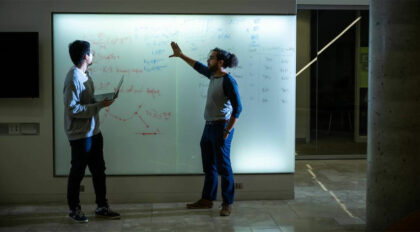Principal engineer in the Beckman Center for Light-Sheet Microscopy on the humble path towards the perfect instrument

The quest for perfection and a thirst for constant learning have driven Joe Li to make cutting-edge and highly customizable microscopy a reality for research teams around the world.
“I refer to it as a disease,” says Joe, a principal engineer in the Beckman Center for Light-Sheet Microscopy, directed by Morgridge investigator Kevin Eliceiri and affiliate investigator Jan Huisken. “I have to try to make something perfect and I’m always thinking about how I can make the system a little better.”
That system is dubbed Flamingo, a portable, shareable, light-sheet microscope that turns out breathtaking images. Joe worked on the team that developed the microscope under Huisken’s leadership.
Light-sheet microscopy uses a noninvasive sheet of light that gives scientists the ability to image samples over hours and days from every angle, providing a trove of data quickly.
A Madison native, Joe earned bachelor’s degrees in electrical and computer engineering and computer science and a master’s in business administration at the University of Wisconsin–Madison.
Joe, who worked in private industry and as a consultant before joining Morgridge seven years ago, spends much of his time customizing the device to serve the highly specialized needs of collaborating scientists working on varied projects. Seven of the instruments are in use nationally, including two at Morgridge and two at UW–Madison.
“Take small steps to get where you need to go. I always see myself as the student. You can always learn more.”
Joe Li
He and the students he supervises are looking at ways to improve Flamingo to support researchers seeking new ways to examine samples. Joe is skilled in computational imaging and instrument control and works closely with the Morgridge Fab Lab.
He also works with Morgridge’s biomedical imaging team and is responsible for all instrument control for the center’s imaging systems.
The light-sheet collaboration is international in scope, as Huisken is now a professor at the University of Göttingen in Germany and Flamingo is being used in other nations, including a new South American effort.
The work yields many rewards for Joe.
“For me, it’s the ability to help scientists advance,” Joe says. “They give us feedback on the instrument, and we can continue to improve it. When we do that, it allows them to move forward with important research.”
As a child, Joe became interested in science through a fascination with radios and other electronics, like CD and VCR players. His interest led him to take physics and programming courses at Madison West High School.
During college, he studied engineering and was enrolled in ROTC. In the late 1990s and early 2000s, he served in the U.S. Air Force, for a time serving in the Middle East, supporting ground troops from the air in Afghanistan.
“It’s about service. I wanted to make sure everyone around me came back in one piece,” he says. “I take that and translate it to engineering work. It’s my job to make sure that this instrument can help people do their job.”
He feels the same way about the students he supervises, making sure that they are equipped with the best techniques and learning experiences available.
For Joe, his work is about endless learning. It’s a lesson he shares with his students and with his children.
“Be a student. Be humble and always eager to learn when people are talking. Keep your eyes and ears open,” he says. “Take small steps to get where you need to go. I always see myself as the student. You can always learn more.”

Rising Sparks: Early Career Stars
Rising Sparks is a monthly profile series exploring the personal inspirations and professional goals of early-career scientists at the Morgridge Institute.
